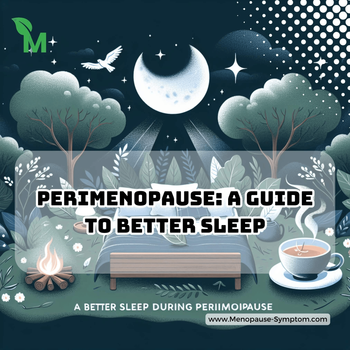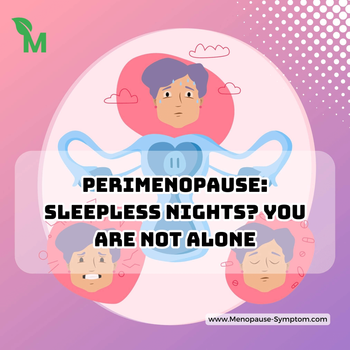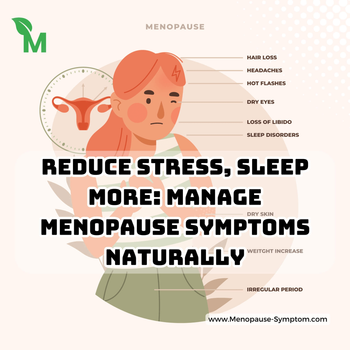Research shows that up to 60-70% of women experience this condition during perimenopause. So how to overcome menopausal insomnia naturally?
Understanding Perimenopause and Menopause
Perimenopause usually begins between the ages of 40 and 50. This is the period when a woman's body begins to produce less estrogen, leading to a series of symptoms such as hot flashes, mood swings and insomnia. Menopause occurs when a woman's menstrual cycle stops completely, usually occurring about 12 months after her last period. Understanding this process will help women have a more positive outlook and prepare mentally for the upcoming changes.
Some typical symptoms of perimenopause:
· Irregular periods: Hormonal changes affect the release of eggs from the ovaries and this can cause periods to be delayed or shortened or stop for a few months. Menstrual bleeding is lighter or heavier and occurs after the age of 40.
· Hot flashes or flushes: Sudden hot flashes and sweating are the most common signs of perimenopause, which can vary in duration or intensity throughout the day and night, accompanied by snoring and difficulty sleeping. Hot flashes can last from 2-5 years. When estrogen levels decrease, blood vessels can dilate rapidly and increase skin temperature. This can cause a hot feeling that spreads from the chest to the shoulders, neck and head.
· Chest pain: When estrogen levels decrease, cholesterol and sugar increase, the heart and blood vessels also become stiffer. This will lead to an increased risk of heart disease due to blockage of blood vessels.
Why does insomnia occur?
Menopausal insomnia can be caused by hormonal imbalances, psychological stress, or simply poor lifestyle habits. Estrogen plays an important role in regulating sleep. When estrogen levels decrease, the ability to maintain sleep is also affected, leading to sleep deprivation. In addition, anxiety and depression can also make insomnia worse.
Natural ways to improve sleep
· Reasonable diet: A balanced diet with plenty of phytoestrogen-rich foods such as soybeans, flaxseeds, and colorful fruits will help balance hormones in the body. Limit caffeine and alcohol, which is important for better sleep.
· Exercise regularly: Physical activity not only helps reduce stress but also increases the production of endorphins - a hormone that improves mood and sleep. Light exercises such as yoga or walking can be very helpful in reducing stress.
· Establish a sleep routine: Try to go to bed and wake up at the same time every day to help your body form this habit. Avoid exposure to technology, blue light from screens 30 minutes before bedtime because they can reduce melatonin, the hormone that helps create a feeling of sleepiness.
Use pleasant scents around your sleeping space
Essential oils such as lavender, chamomile and bergamot have long been known to have relaxing and sleep-enhancing effects. You can use an essential oil diffuser in your bedroom or add a few drops of essential oil to your pillow to feel the difference.
Meditation and relaxation
Meditation techniques can reduce stress, anxiety and improve sleep quality. Just spend 10-15 minutes a day doing a simple meditation, you will feel your mind lighter and more comfortable.
Natural herbs
Many natural herbs can support sleep well, such as jujube, chamomile tea or white tea. These herbs can help calm your nervous system and help you fall asleep more easily. However, you should consult your doctor before using herbs to ensure safety.
Consider hormone replacement therapy (HRT)
If you have severe menopausal insomnia, you may want to consider hormone replacement therapy (HRT). However, this is a big decision and you should consult your doctor to ensure that you are making the right choice for your health.
Time for yourself
During perimenopause and menopause, self-care is extremely important. Regularly make time for activities you enjoy, whether it's reading, gardening or simply enjoying a delicious meal. This will not only improve your mood but also show you care for yourself.
Support from friends and family
Sharing the symptoms of perimenopause and menopause with friends and family can help you feel like you're not alone on this journey. Emotional support from those around you can help you overcome difficulties in sleeping.
Regular health check-ups
Finally, don't forget to have regular health check-ups to monitor your health during perimenopause and menopause. Detecting health problems early can help you deal with them more effectively.
Summary, overcoming menopause insomnia may not be easy, but with the right preparation and natural methods, you can find better sleep and better health. Remember, you are not alone in this journey, and every small step can make a big difference. Perimenopause is not only a difficult time, but also an opportunity to rediscover yourself and enjoy life more fully.
Source: Team MPS compiled, analyzed and wrote. Please dont reup without source. Many thanks.

Perimenopause: A Guide To Better Sleep
Invalid Date
Perimenopause is an important transitional stage in a woman's life that usually begins after the age of 40. This is the stage when a woman's body experiences many changes related to psychology and physiology, as well as health.

Perimenopause: Sleepless Nights? You Are Not Alone
Invalid Date
In the journey of life, women often face many different stages, each stage brings its own challenges and changes. One of the most memorable stages is perimenopause.

Reduce Stress, Sleep More: Manage Menopause Symptoms Naturally
09.02.2024
Menopause is a natural phase in every woman's life, usually occurring between the ages of 45 and 55.
